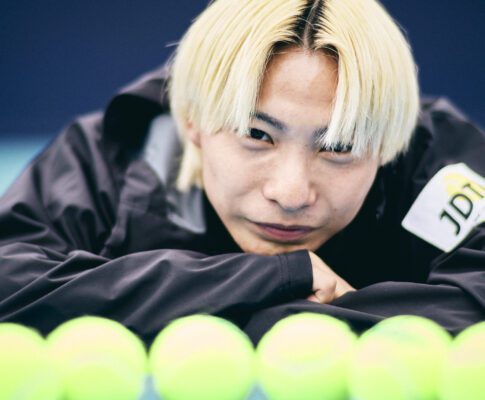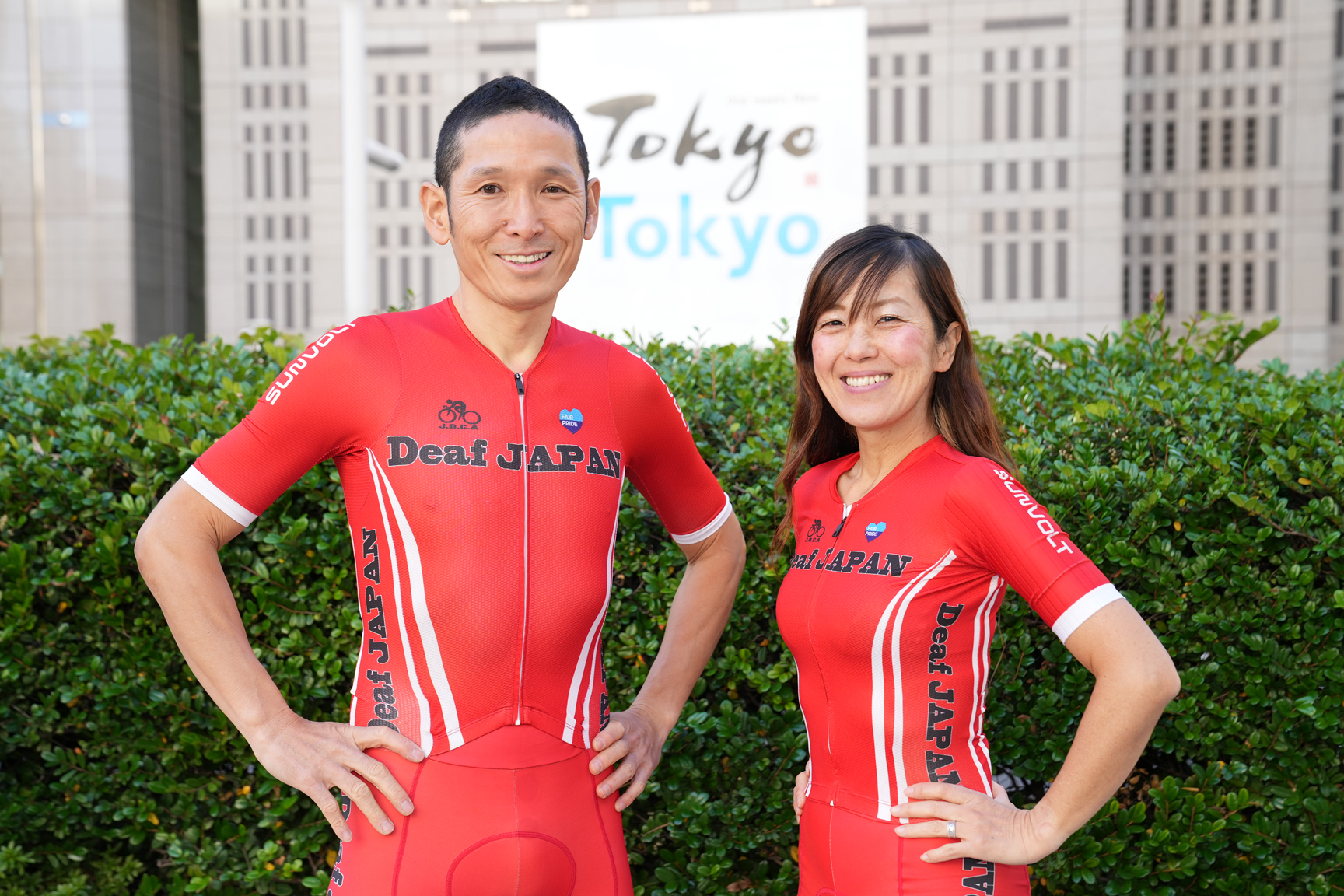
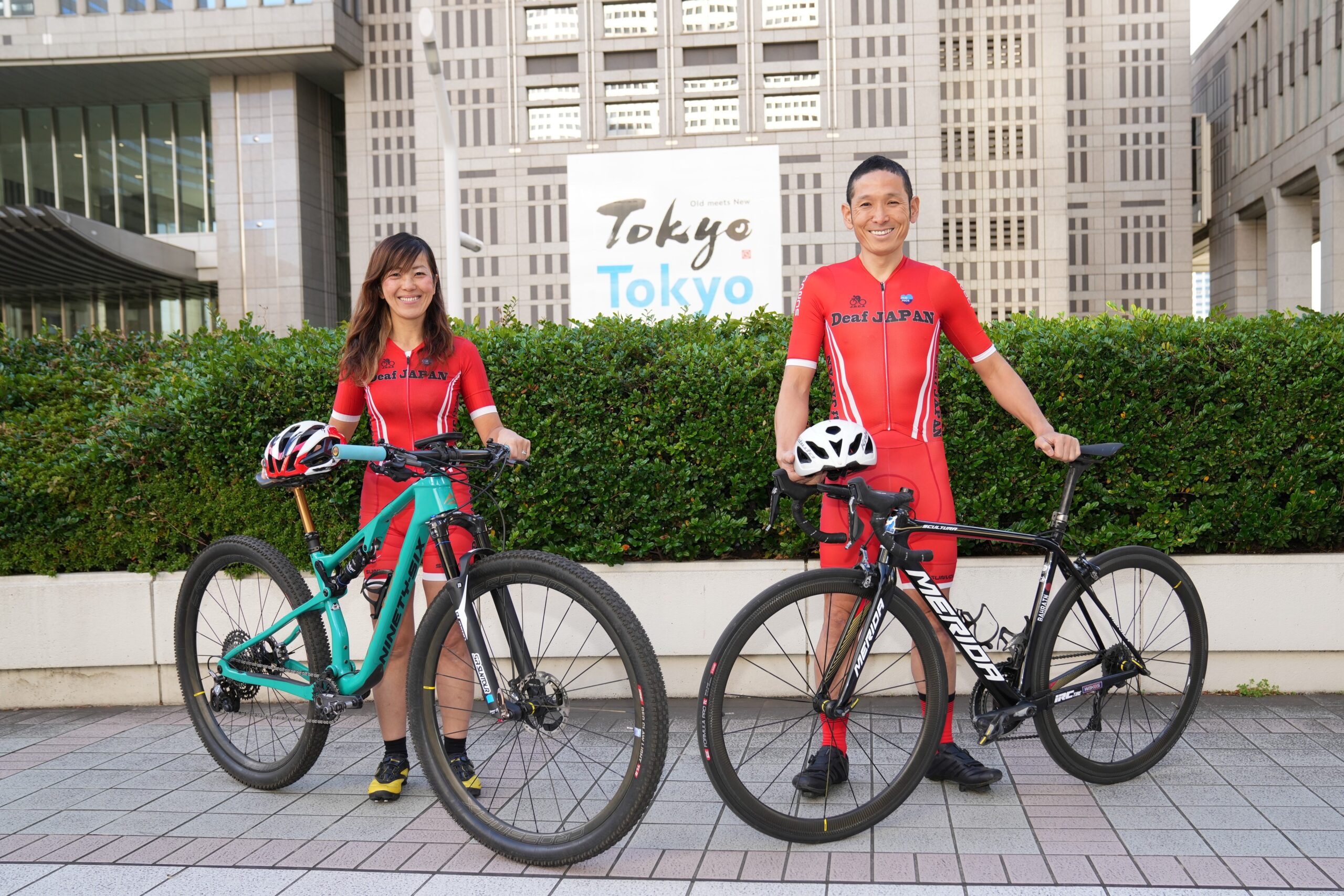
Right: Kentaro Hayase
Born 1973 in Nara Prefecture. He placed 6th in the men’s sprint cycling at the Samsung 2017 Deaflympics.
He runs Hayase Dojo, a cram school in Yokohama. He is active in various fields as a sign language entertainer, such as working as a film director.
Left: Kumi Hayase
Born in Oita Prefecture in 1975. She won three consecutive medals with a silver medal in the women’s mountain bike cycling.
She was the leader of the Japanese team at the Samsung 2017 Games. She became the first Deaf person to become a pharmacist in 2001 due to a change in the law.
Never Expected Both Spouses to Compete Together in the Deaflympics
–Please tell us how you got started in cycling.
Kentaro-san When I was 20 years old, I had a part-time job at a bicycle store, and that is where I fell in love with bicycles. At the time, it was just a hobby of riding my bicycle to go out to eat good food. I started competing in earnest in 2009. A student of mine from my cram school competed in the Deaflympics in Taipei 2009, so my wife and I went to support him. Witnessing the Deaflympics in person, I was shaken to my core by the struggles of the Deaf athletes representing their countries. I strongly felt that I wanted to stand on this stage as well, a challenge I have taken up when I was 35 years old.
Kumi-san I was a sports pharmacist* at the 2009 Deaflympics in Taipei, so I first got involved in the Deaflympics as a pharmacist. When my husband asked me if I wanted to compete with him, I was not really interested in cycling. But when my husband started cycling and started competing in competitions, I was impressed by the seriousness with which he approached the Deaflympics. So I started competing to aim for it with him.
※*A pharmacist who is one of the certified pharmacists and has accurate information and knowledge about the latest anti-doping regulations. Their main activities are to prevent doping in sports by providing sports enthusiasts, including athletes, with guidance on the correct use of medicines and promoting and educating them on health education related to medicines.
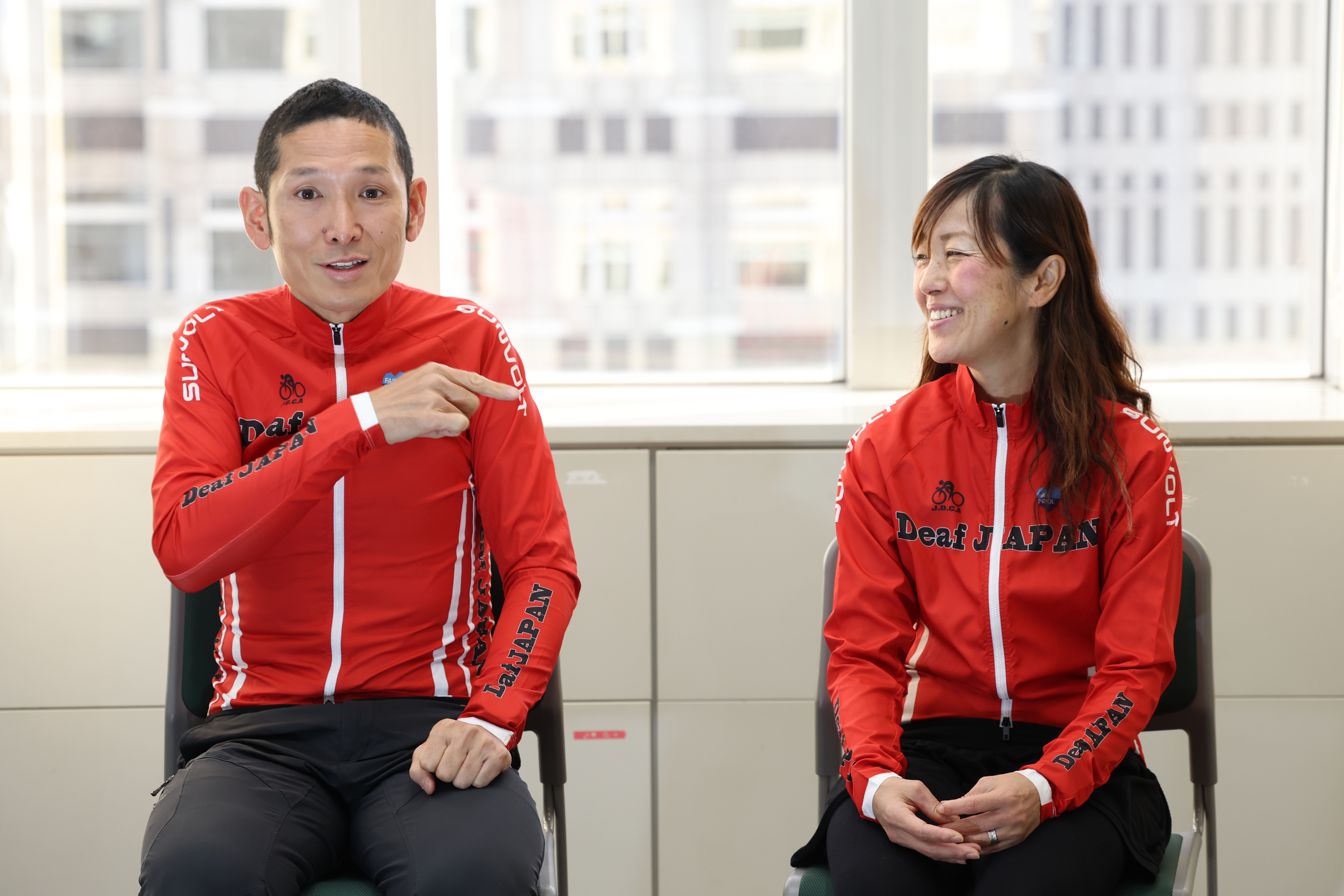
Kentaro-san That’s a little untrue (laughs). I am a road racer now, but I originally started mountain biking first. When my wife came to cheer me on, I made a mistake and fell. I thought she would be worried, but she said, “I can do better than you!” I told her to give it a try, and she did. I never expected both spouses to compete together in the Deaflympics. And I never thought she would win medals in three consecutive games. Also, we both like sports, and have played badminton, tennis, table tennis, bowling, mountain climbing, and many other things, but I have lost at all of them (laughs).
Kumi-san I hate to lose, so I don’t play games that I think I will lose (laughs).
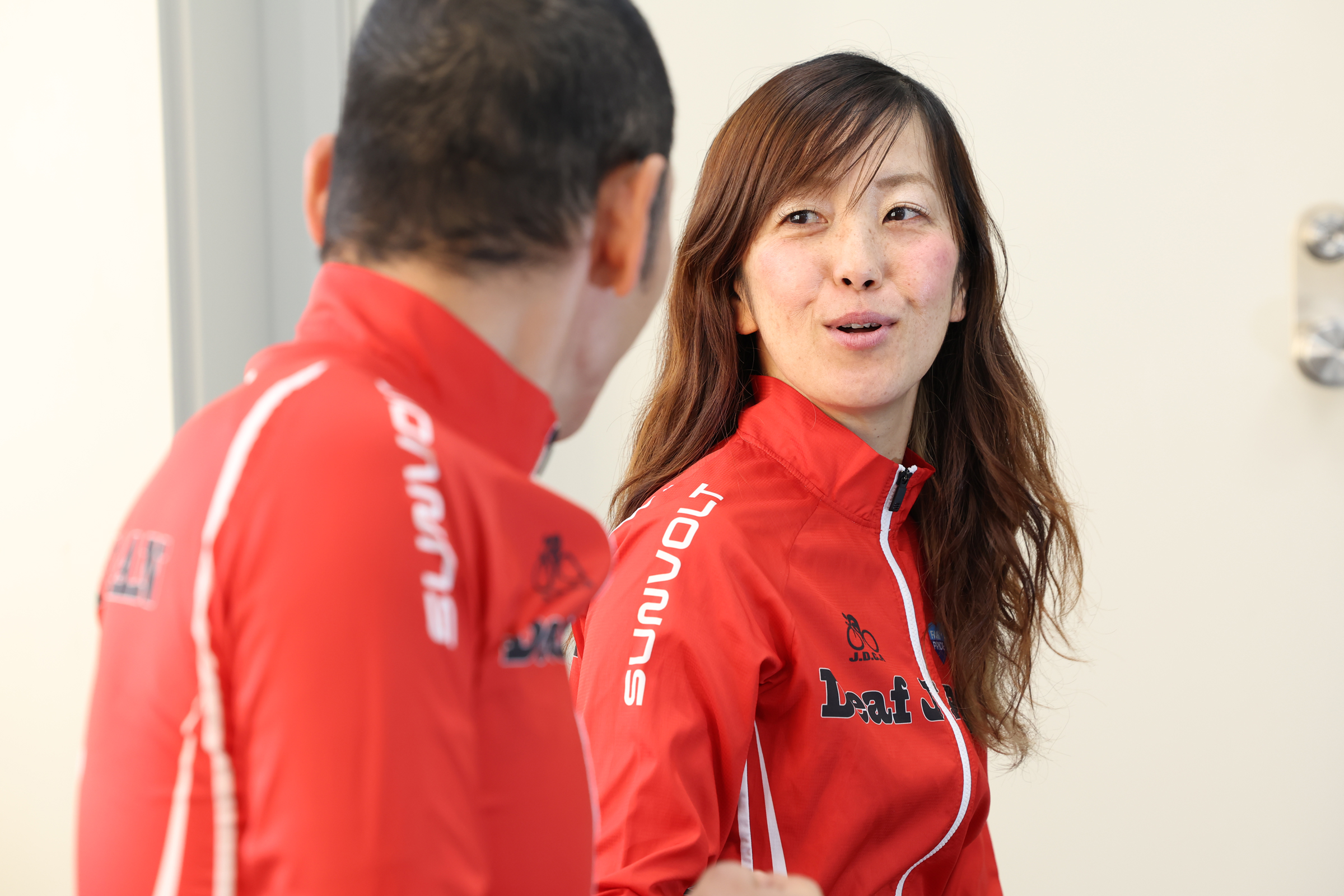
Kentaro-san I am good at shogi, but my wife would never play it even if I asked her to. When my wife started to play bicycle, I thought, “Oh, she is really trying to win.”
Kumi-san I don’t want to lose (laughs). Of course, I respect him as a deaf person. I met him when I was a university student, and since that time, he has been walking with his feet on the ground toward his goal with his own beliefs. He has appeared on NHK and made movies based on his educational activities, and I think he has a genius that others don’t have. I sometimes feel a complex about my husband, who can do anything, but I have a lot to learn from him, and I respect him a lot. But in sports, I want to be the best (laughs).
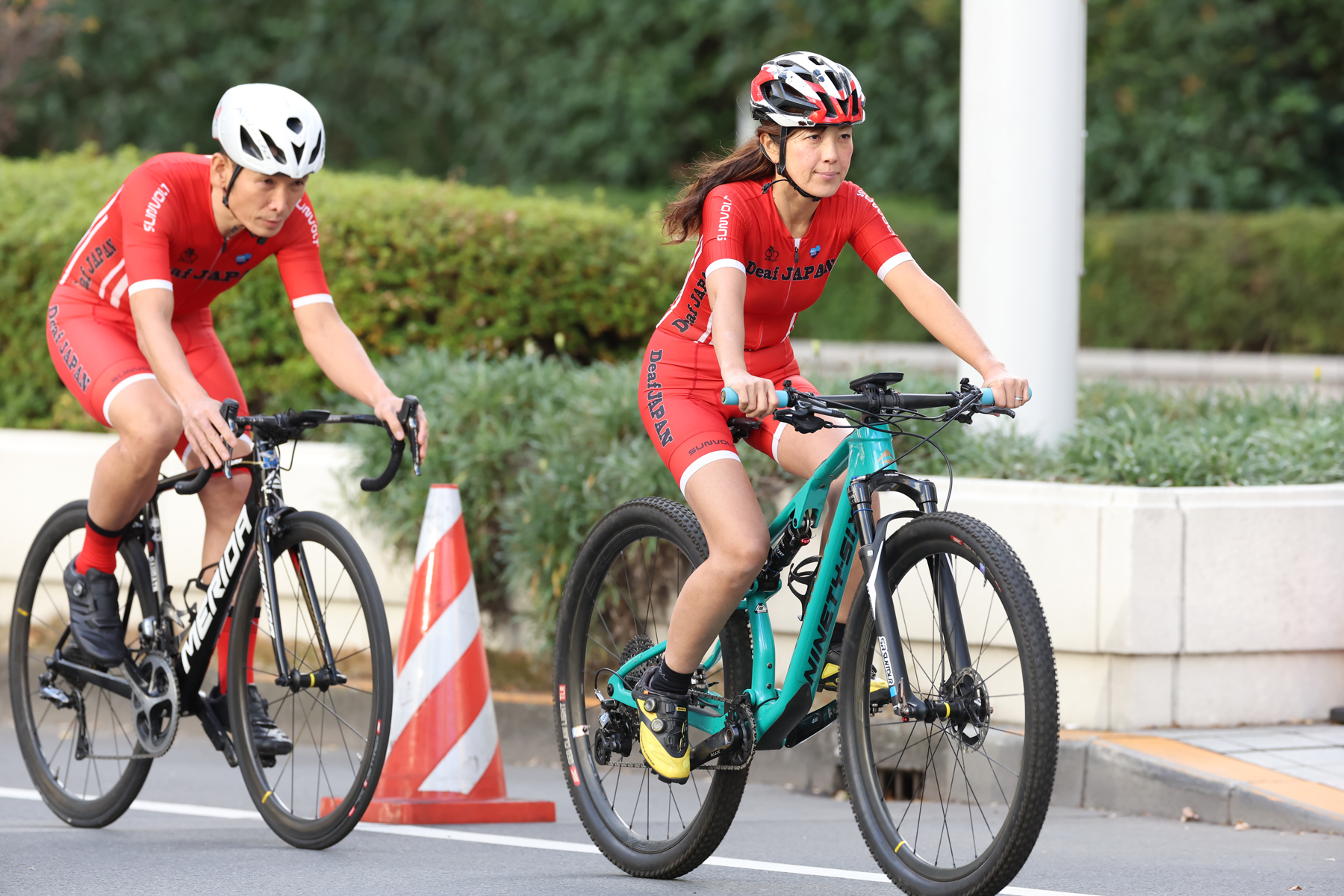
Passion, Time, Money… Investing All of My Current Self
— Have there been any changes since you started competing in earnest?
Kumi-san In competitions, there is the usual preparation and practice, and then the real race is an extension of that. Mountain biking in the Deaflympics takes a little over an hour, but you spend four years for that one hour. In terms of hours, that’s 35,000 hours. But the result has nothing to do with the fact that I practiced a lot or that I worked hard. It’s about how much time you can spend facing yourself. I used to be the kind of person who didn’t want to lose to anyone else, but when I started competing, I began to think that it’s not about winning or losing, but about talking to myself. My husband has become more stoic in preparation for the competition, and he faces the results head-on. I feel that my husband has influenced me in many ways. I think that may have changed.
Kentaro-san There are two things that I think have changed. In the past, I was often asked “It’s a hobby, isn’t it?” I answered, “No, it is not a hobby. It is something I entrust my life to.” No one asks an Olympic athlete, “Is it a hobby?” Like Olympic athletes, I put my passion, time, money, and everything I have into it. Now that the Deaflympics have become more well known, people rarely ask me, “Is it a hobby?”
The other is awareness. This is something my mother taught me, and I really like the phrase, “Fear failure, but don’t hesitate to challenge.” It does not mean that I do not fear failure, but that I am afraid of failure. Because we are afraid of failure, we face it and think about what is necessary. As a result, even if I fail, I am satisfied within myself. The accumulation of such experiences gives me great strength to continue taking on challenges. My character has always been “Que Sera, Sera,” (whatever will be, will be), and I have never been afraid of failure, good or bad, but now I have a proper fear of failure. This is probably the part of me that has changed since I started competing.
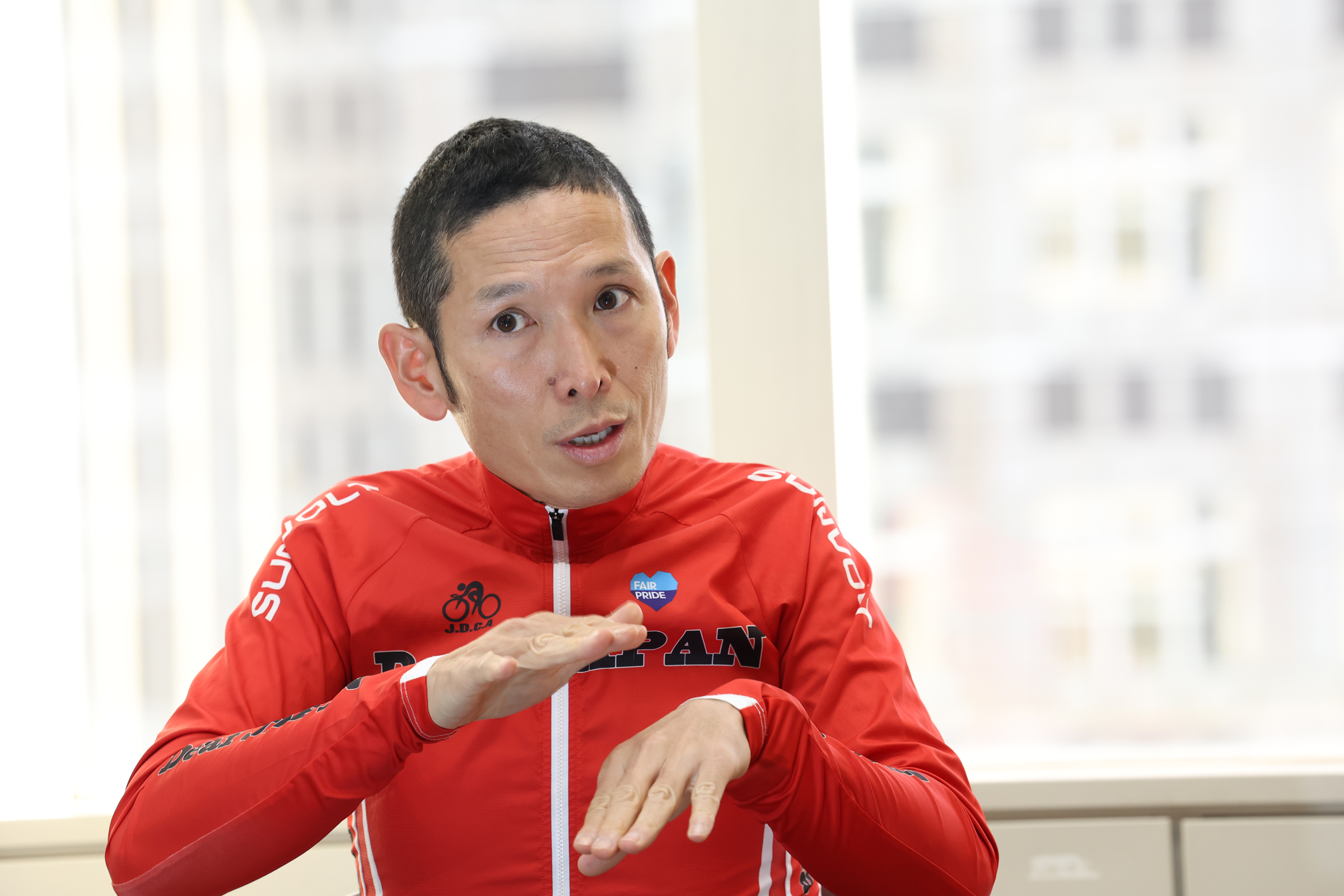
Only Months After Games Confirmation, Achieving Medal Success
–What memories do you have of the Deaflympics in which you competed?
Kentaro-san The Sofia 2013 Deaflympics was my first time competing, so everything was new to me. The result was not good, but I got to know the world and learned about my own strength. At the next Deaflympics in Samsung 2017, I was really close to a medal, but I had a fall and got seriously injured. Since then, no matter how well I do in domestic competitions, I can’t forget the nightmare I had and I still have flashbacks of it when I sleep. The only way to erase this is to achieve a result I am satisfied with at the Deaflympics. In that sense, it is a competition I will never forget. On the other hand, as for the Caxias do Sul 2022 Deaflympics, it was completely different from the previous ones because the opponent I was fighting was Corona.
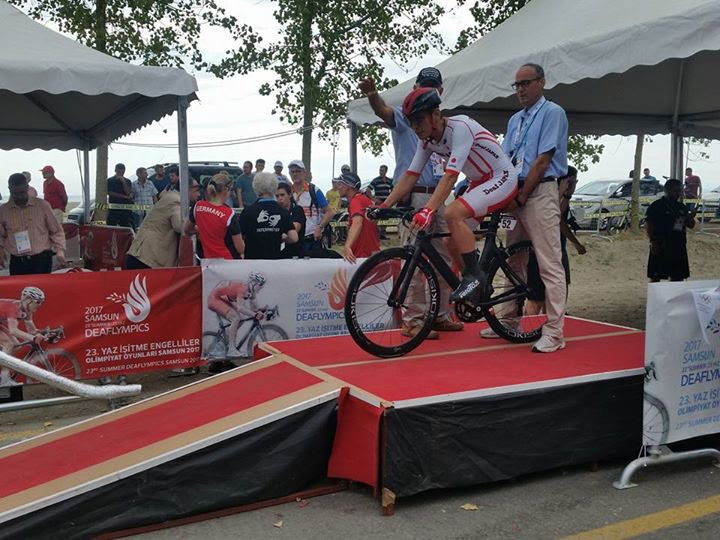
Kumi-san At first, the Sofia 2013 Deaflympics was only for road cycling for women, but a few months before the event, it was decided that mountain biking would also be held for the first time, so I decided to participate as a staff member and athlete. It was the first time for me, I was nervous and didn’t know what was going on, but I managed to get a medal, saved by a puncture from a leading rider. At the Samsung 2017 Deaflympics, I competed in mountain biking in addition to the four road events. I was able to prepare well based on my previous experience, so I was satisfied with myself, winning a prize in road cycling and a medal in mountain biking. At the Caxias do Sul 2022 Deaflympics, I had to think about the whole athletes as a sports pharmacist because of the Corona. I was pleased not only to win a silver medal in the Deaflympics competition, but also to be able to successfully link my profession as a pharmacist.
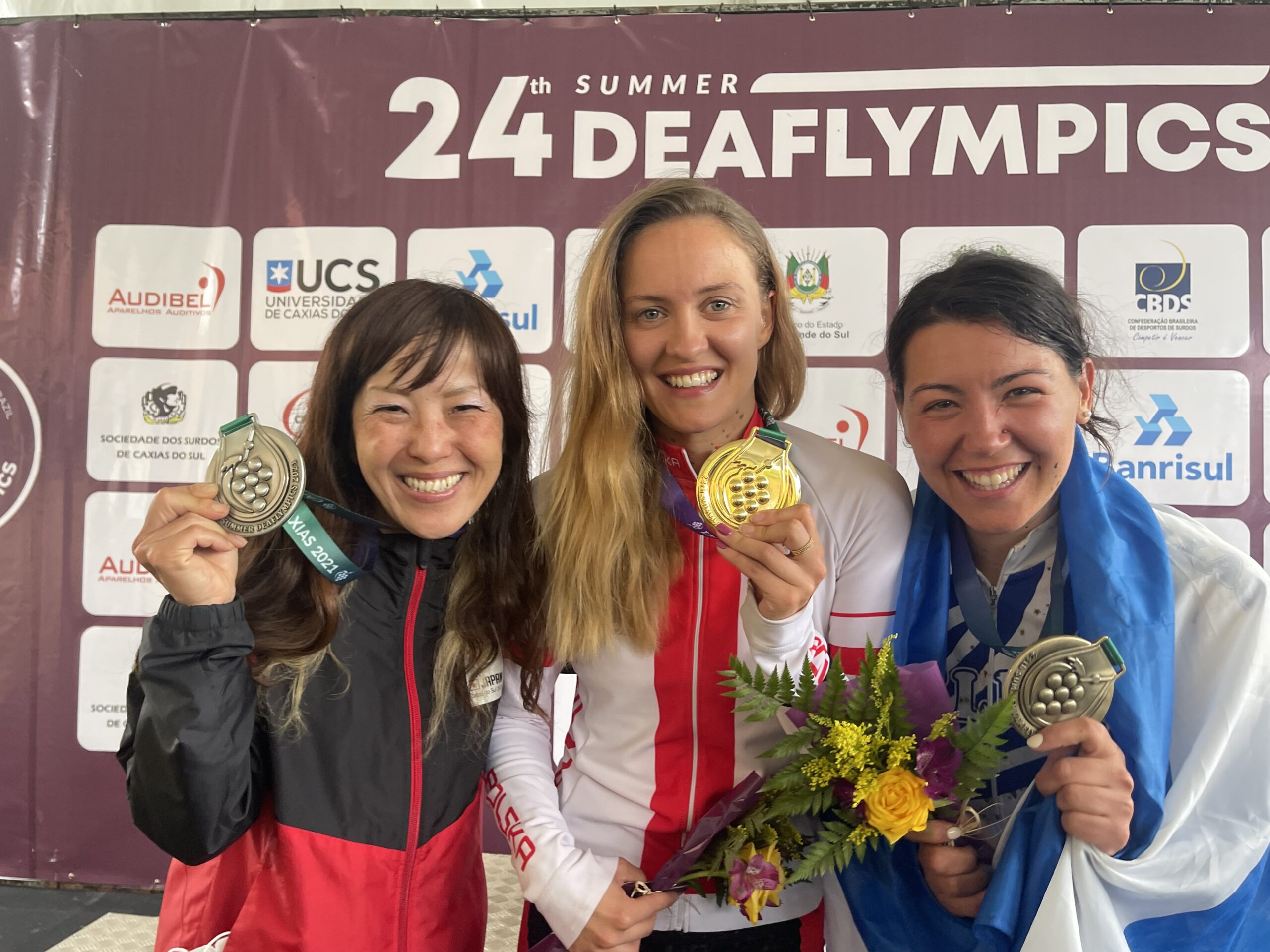
She was very successful both as an athlete and as a sports pharmacist.
Kentaro-san My wife was the captain of the Japanese team at the Samsung 2017 Deaflympics. I think she felt tremendous pressure because there was a jinx that captains do not win medals. However, she ended up winning a medal, and being the captain allowed her to interact with athletes from a variety of sports. That experience is still alive today, and as a sports pharmacist, she is consulted by many athletic organizations. I think that winning their trust at that time was a big factor.
The Deaflympics: Deciding the World’s Best in Soundless Sports
–What kind of event do you both want the Tokyo 2025 Deaflympics to be?
Kentaro-san As for myself, it may be time for me to be tapped on the shoulder due to my age (laughs). However, age is irrelevant in the world of competition, and I think it is purely a matter of who is the strongest. I want to be a high wall for young players. Right now, I don’t have the feeling that I can lose yet.
Kumi-san How about me?
Kentaro-san You would have me beat (laughs). As an athlete, it is a tremendous honor to be able to represent my country at the Deaflympics. On the other hand, I also want to make the Deaflympics more exciting from a different standpoint. For example, what I am doing now is to provide live commentary of the competitions by Deaf people for Deaf people. This is not limited to the Deaflympics, but I would like to make it a normal situation for Deaf people to provide play-by-play commentary in Deaf sports. We should not let the Games end as just a festival. I believe that the future after the Deaflympics is over is the real challenge for me.
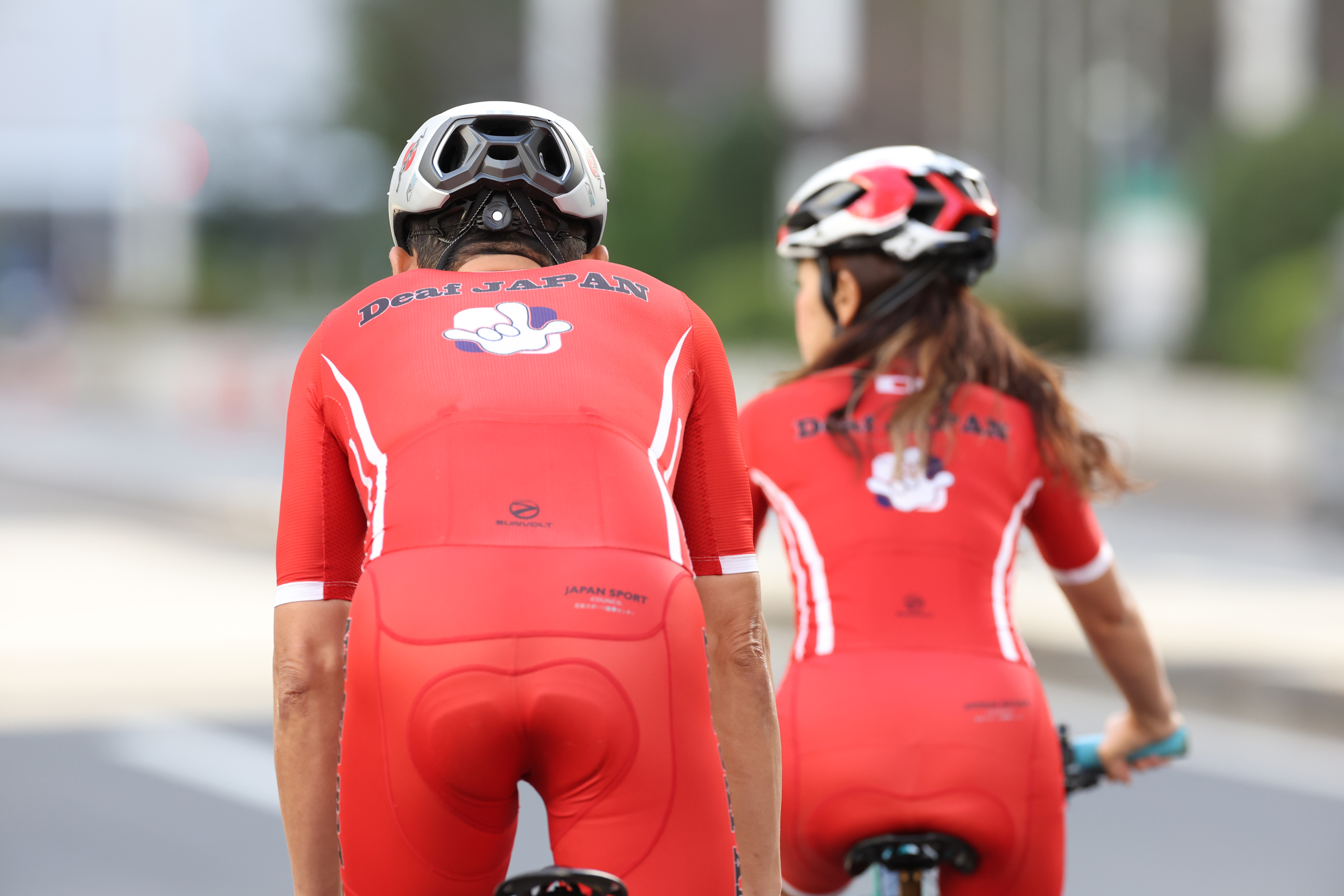
Kumi-san I am very happy to be able to be involved not only as an athlete but also as a member of the steering committee for the 100th Deaflympics. How do we design a society 100 years from now and leave a legacy? I believe that I also have such a role to play. I believe that I also have such a role to play.
In terms of competition, I am inferior to foreign athletes who are bigger in terms of power, but this time the course is designed to emphasize skill, so I hope to win with skill in the end. Also, as a behind-the-scenes person, I want to be involved in various things, just like my husband. My husband and I want to do different things, so we say to each other, “That’s what you want to do. That sounds interesting,” and we get excited about it.
Kentaro-san The Deaflympics is ” Deciding the World’s Best in Soundless Sports.” The ability to utilize sight in sports is outstanding. If we were to compete in the same events as hearing athletes under the no-sound rule, I think Deaf athletes would do very well. I think that hearing athletes are able to distinguish between all sports by sound. Everything is a “competition with sound.”
In cycling, for example, you can hear the sound of a gear change and know when the other rider is about to attack. We Deaf athletes judge everything by sight. At the Deaflympics, it is so amazing that everyone’s eyes pierce all over your body.
It is not that one is better or worse than the other, but that there are differences in the way of competing with sound and the way of competing without sound. The fact that there are competitions in the world without sound is the attraction of the Deaflympics, and through the Deaflympics, I would like people to know how amazing Deaf athletes are.
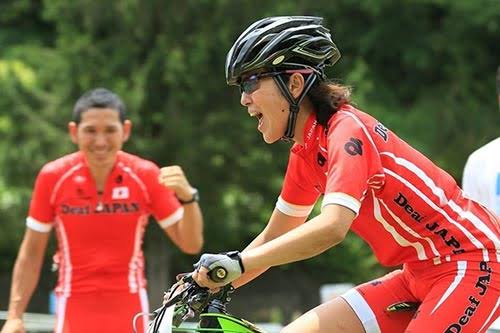
What I Like to Do is “Unexplored”
–Please tell us about your personal life. What do you do on your days off?
Kumi-san Riding a bicycle (laughs). Neither of us has ever had a day off. We both work during the week, and on weekends we have races and lectures. Of course, we sleep well at night (laughs).
— If you could take a day off together, is there anything you would like to do?
Kentaro-san Instead of training, we would probably ride a bicycle together for about 200 km, take a hot spring bath, and eat delicious food.
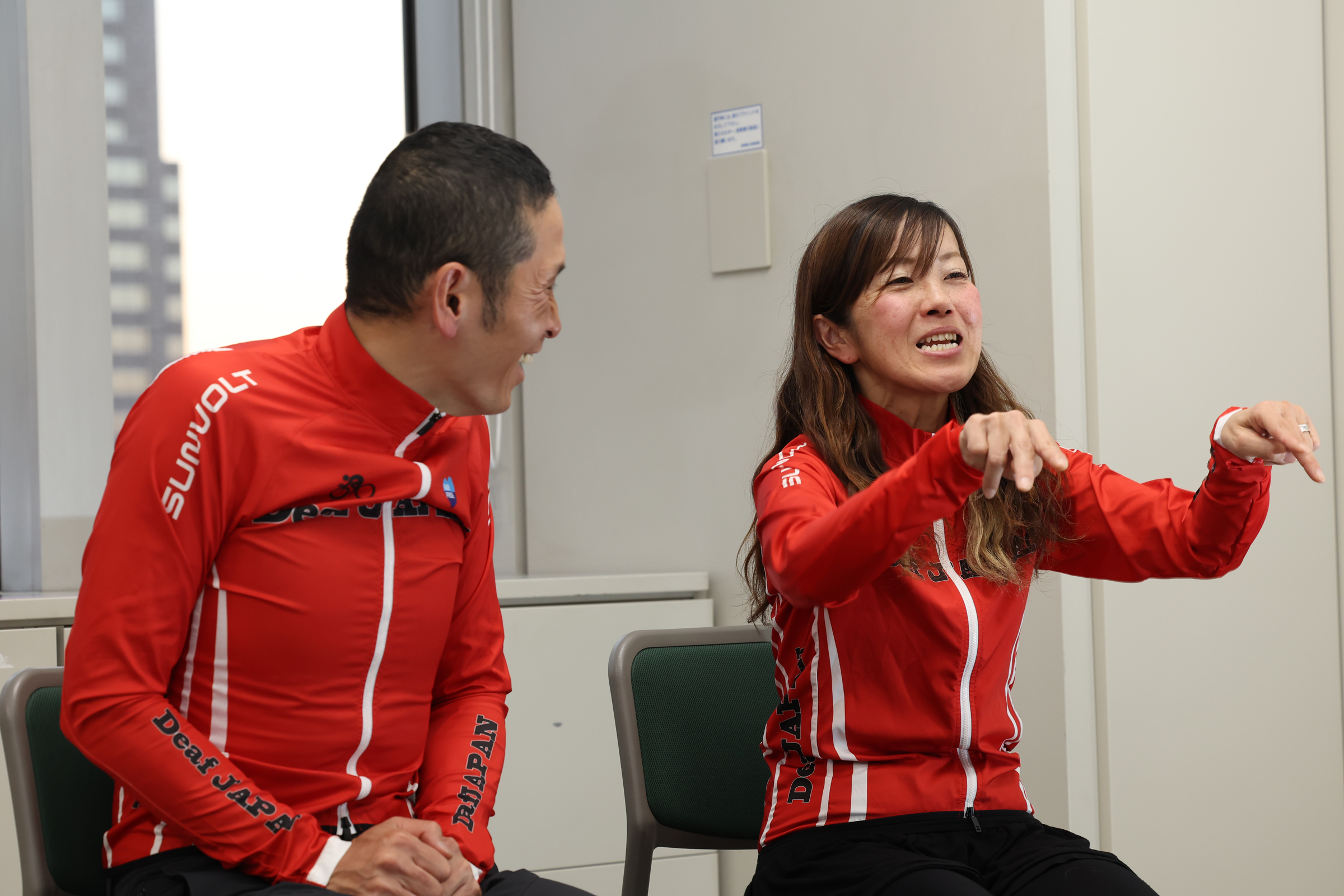
–I think you will get along well with that.
Kentaro-san No, we don’t get along.
–I thought it was “Shinkonsan irasshai ” (Welcome Newlyweds!).
Kumi-san Then the host has to turn it over (laughs)!
–What did the two of you do together before you started competing?
Kumi-san My husband basically hates waiting in line, so we don’t go to crowded place like Disneyland or amusement parks. I also like screaming rides, but my husband is not good at them. He also hates haunted houses. He also doesn’t like museums. He wants to go to the movies by himself. Our compatibility was terrible from the moment we met.
Kentaro-san To begin with, I don’t remember us going anywhere on a date (laughs). We often played sports together.
Kumi-san We both liked to travel and often went abroad. We would look up places and countries that no one else seemed to go to and go there.
Kentaro-san What I like is when people say things like “Japan’s first!” or “World’s first! ” (laughs). I love things that no one has ever done before or that are unprecedented. When I get an offer like that, I immediately say, “Let me do it! ”
I want to go where no one has ever been before. I want to eat food that no one has ever eaten before, and even if it tastes bad, that’s fine, as long as I enjoy it.
Change the Law and Become the First Deaf Person to Become a Pharmacist.
–Kumi-san, you have accomplished something unprecedented by becoming the first Deaf pharmacist. What have you gained or felt along the way?
Kumi-san I was really worried when my application was rejected after passing the national examination. I asked myself weather I was really going to become a pharmacist. I did not want to waste all the time and effort I had put into my studies if I stopped halfway through the process, so I discussed the issue with my parents. The law did not allow deaf pharmacists, but it was difficult to change that by myself. So I got others involved and we worked together to make it happen. There were more than 60 conditions that were prohibited. As a result, it became a big movement to change all of them. I think that by being able to qualify, we were able to create a way for people like me to live, and it was a great experience for me to be able to play a valuable role in that.
Kentaro-san If it were me, if the law said no, I would have given up there. I think this is truly unprecedented. Moreover, it was not just her alone, but many medical professionals were born afterwards. I truly respect my wife for that.
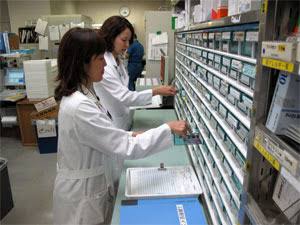
–Ketaro-san, what was the impetus for you to make a film?
Kentaro-san My high school students told me that they wanted to see a romantic drama by a deaf person, since most of the romantic dramas in movies and TV dramas were made by people who can hear. It is true that at that time, there were no romantic dramas featuring only deaf people. I thought, “Whoa! Here comes something unprecedented! ” and that’s when I started making films on my own.
–Do you have any thoughts or messages you want to convey through your films?
Kentaro-san I try not to put messages in my films. I want to make films that create messages in the hearts of the people who see them. I want people to enjoy the films as entertainment.
However, people who have seen the films often tell me that the theme of all three films has the thema of “family ties”. I didn’t aim for this, but now that you mention it, it may indeed be true. I am also asked, “Why are all the main characters medical professionals?” In the first film, a pharmacist woman is one of the heroines, and in the third film, “Sakimu,” a nurse woman is the heroine. I actually didn’t think much of that either (laughs). I may have been unknowingly influenced by my wife. I like “Kaseifu ha mita ” and “Kasouken no Onna ,” so next time I would like to make a film like “Forensic Deafness” (laughs).
It is not a question of “can I do it or not,” but “do I want to do it or not?
–I think you both have great careers, balancing competition and work. What advice would you give to someone who is unsure about their career?
Kumi-san If you decide to do something, do it. Of course, there will be failures and regrets along the way, but I think there is a lot to be gained from that. My parents had this way of thinking, and it is partly because I was raised in such an environment, so in the words of my husband, “Fear Failure, but don’t Hesitate to Challenge.” I would like you to try anything.
Kentaro-san When I am unsure about something, I do not think about whether I can do it or not, but whether I want to do it or not. If I genuinely want to do something, I will do it. I think people’s psychology is that they don’t want to lose money, so they think in terms of whether they can do it or not. But if you think about that, you can’t take action, and if you didn’t do, you will lose the opportunity. First of all, if you want to do something, decide to do it and act immediately. You can worry about it after doing. I think everything is about timing. To make the most of a moment in time, your desire to do something is everything.
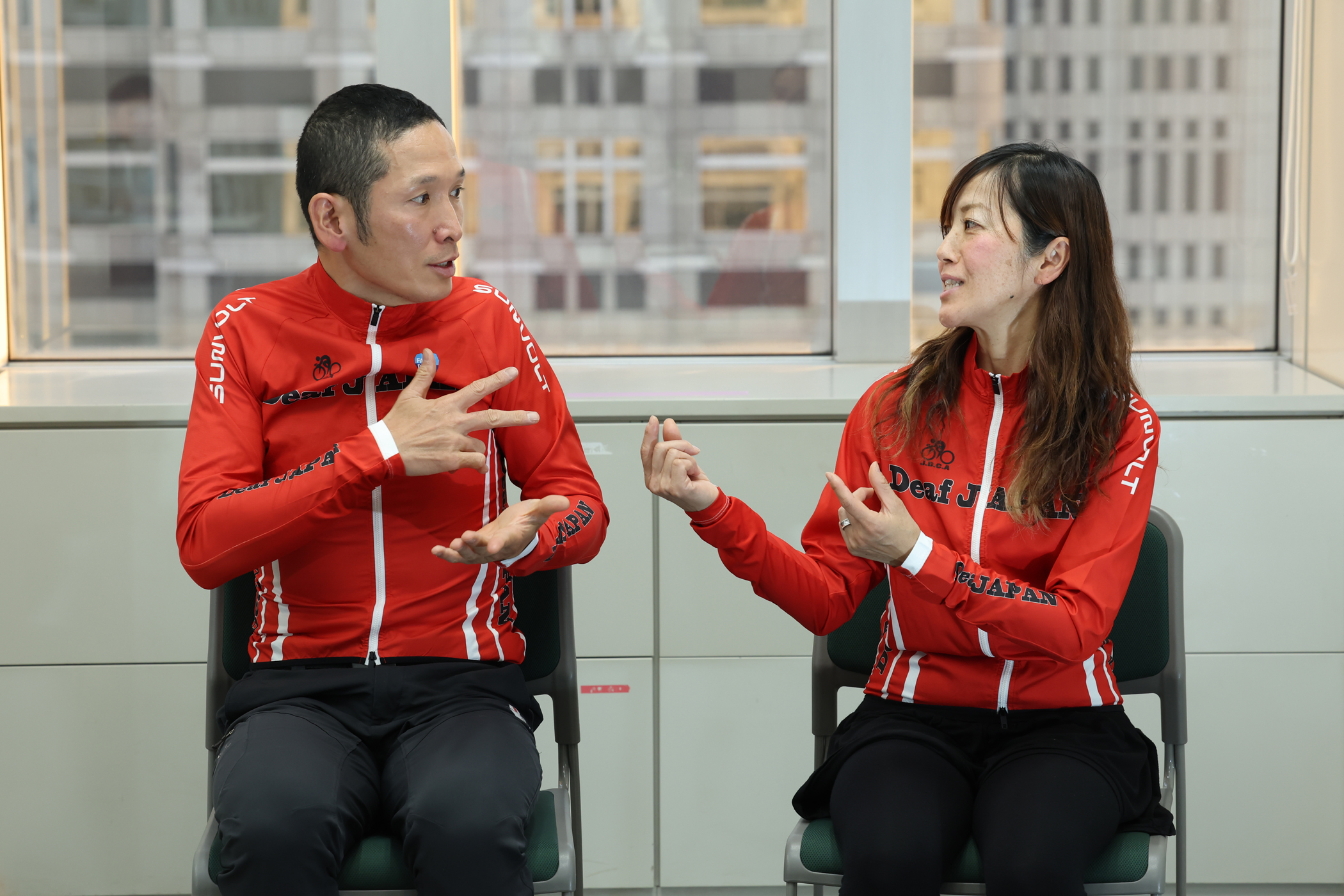
–Finally, please give us some words for the Deaflympics.
Kentaro-san I hope that everyone will think about the Deaflympics not in terms of “what the Deaflympics can do for me” but rather “what I can do for the Deaflympics.” If each of us wants to do it, we can get involved with the Deaflympics in various ways. If we start by thinking about what we can do, I believe that our thoughts and feelings will be connected even after the Deaflympics are over.
Kumi-san I think that by getting involved yourself, not anyone else, you can be a step toward changing society. It doesn’t matter if you are a volunteer or a cheerleader. When I returned home from the Deaflympics, I found a banner that read “Congratulations! We won a medal” banner. The people in my town put it up and said, “You gave us a lot of energy! ” I was so happy to see it. It brought tears to my eyes and I thought, “This is what it means that the Deaflympics can change society.”
I would be very happy if you could be involved in any way in the Tokyo 2025 Deaflympics!
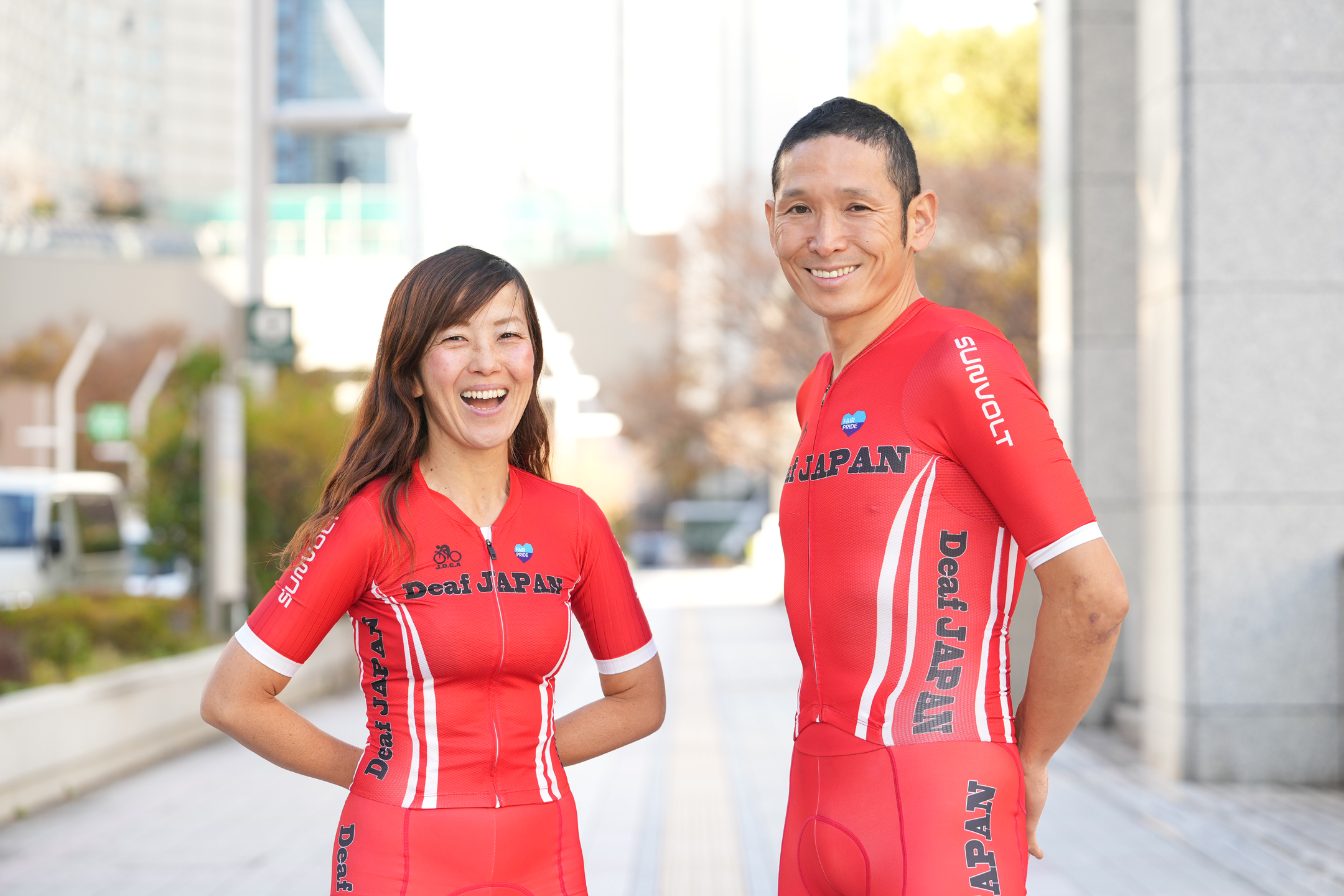
Kentaro Hayase
Instagram:kentaro.hayase(https://www.instagram.com/kentaro.hayase/)
Facebook:https://www.facebook.com/kentarohayase0427
X:@kentarohayase(https://twitter.com/kentarohayase)
Kumi Hayase
Instagram:kumihayase(https://www.instagram.com/kumihayase/)
Facebook:https://www.facebook.com/kumihayase0425/
X:@kumihayase(https://twitter.com/kumihayase)
text by Moritaka Ohashi
photographs by Kiyoshi Sakamoto
